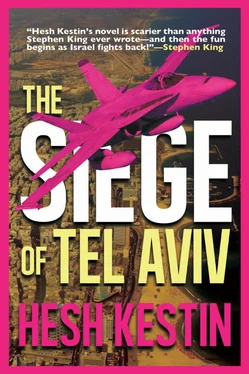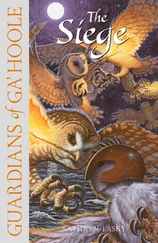“Guys, sandwich high and low. I’m head on. Anybody doesn’t take out thirty of these mothers is a douchebag. Look at those innocents, flying so close. Fire well and you’ll hit two with one rocket. Just one more small thing: nobody returns to base with unexpended ammo. Repeat: pouches empty, not one round. Happy hunting. Over and out.”
His left and right wingmen peel off. All three planes go vertical, attacking from below.
IN THE JORDAN VALLEY, his clothes torn and bloody, Lieutenant Cobi stumbles to the edge of a grove of date palms planted in a precise geometric grid. He knows he must find cover. Whatever is happening, Cobi intends to survive long enough to get back to a tank unit, any tank unit, where he can be useful. Like almost every other Israeli, he has no idea of the extent of the debacle, nor of what will come next. Almost all military communication is crippled, if not neutralized entirely. All he knows is that he is alone in a landscape barren but for the date palms, whose neat rows offer shade and perhaps water if he can find the source of the irrigation system that keeps them alive. Above him are tons of dates, probably not ripe but possibly edible. He intends to try one and wait for the effect, which he hopes will not be the runs. But first he must find cover and try to sleep. There is no sense attempting to locate friendly forces during daylight. His only chance is to wait until nightfall and proceed west.
He kneels, exhausted, his weight on his short-barreled Tavor rifle. For the briefest possible moment he allows his eyes to close, then—even before he knows why—his lids raise as though on springs. He looks up at the unmistakable metallic sound of a weapon being cocked.
Before him, almost within reach, is a Bedouin silhouetted against the rising sun. The Bedouin holds a shotgun. It is pointed straight at his head.
SIXTY MILES TO THE southwest, a parachutist floats silently toward earth. Above him, he sees his plane smash into an enemy fighter, both aircraft exploding simultaneously. Kamikaze tactics are not taught at IAF Fighter Academy, but with a crippled engine and depleted ammunition, it was either eject or lock his jet onto an enemy plane and then eject. A difference of seconds. His port wingman does not have that choice. A squad of Egyptian F-16s brings him down early in the engagement. His starboard wing remains airborne, but the parachutist doubts the poor guy will survive. With little to no ammunition, it will be a fox hunt, a dozen Egyptian aircraft in pursuit armed with heatseeking AIM Sidewinder missiles. As he descends, he can see above him the Egyptian F-16 and his own aircraft plunging to earth in pieces, the same planes really—though the IAF version carries electronic modifications by Israel Aircraft Industries, both aircraft were manufactured by Lockheed Martin at the same factory in Fort Worth. The pilot about to come to earth visited that factory, just as it is possible his Egyptian counterpart, now dead, did also. For some reason this causes Alex to grin as the ground comes up fast to greet him with a thud.
IN THE BATHROOM OF his suite thirty-one stories above the roiling streets below, where thousands of American Jews are flooding in to demonstrate outside the United Nations General Assembly, Shai Oren, ambassador to the UN of all that is left of the State of Israel, shaves himself carefully with a straight razor, as he does every morning.
The razor was his father’s, a prosperous furrier in Dusseldorf who in 1939 brought it with him to what was then British-governed Palestine. The Nazis had closed his business two years before. It took every pfennig the old man could gather together to buy the family out—what little savings were left, his wife’s jewelry, the proceeds from the sale on terrible terms of their country house, the sale on even worse terms of a small Courbet that had hung over the fireplace in their home in the Oberkassel.
The razor, with its bone handle and Solingen blade, both worn down, like the old man himself is a talisman, a touchstone, a memory in ivory and steel of the time before the Oren family, then Kiefer, came to Israel as refugees, carrying little more than the clothes on their backs, heavy woolens unsuited to Israel’s climate, and a new German-Hebrew dictionary.
In 1939, Ambassador Oren’s father was thirty, spoke no Hebrew, and his only knowledge was of furs, not a likely path to success in the Middle East. Like tens of thousands of other German-Jewish refugees, who insisted on wearing jackets in the Palestinian heat, and ties, and proper shoes, not sandals, Ambassador Oren’s father was part of a lost generation, unintentional Zionists, a people cut off from their Central European roots.
Among the few who did succeed in the holy land were a small group of architects who immediately found work as Jewish willpower built up the land (and who later emigrated to the US when the building boom ended), along with those whose professions were portable: bankers, musicians, doctors, dentists, accountants. Lawyers either learned Hebrew and prospered or could not and didn’t. The rest, like Ambassador Oren’s father, whose optimistic first act in the holy land was to exchange the old family name, German for pine , to its Hebrew equivalent, were condemned to agriculture or modest commercial activities. Some sold cigarettes in the street. The old man had held out until little Shai was six before slitting his throat with the same razor his son now holds in his right hand.
He has shaved half his face, holding his chin in his left hand like an object unconnected to him, stretching the skin for a clean cut. “This is it,” he thinks. “I have reached the same state as my father, hopeless and fatigued and no longer sure of who I am.”
Ambassador Oren had always considered the old man a failure, gutless in the face of a wall of impossibilities. All his life, Ambassador Oren had never backed down in the face of calamity. As a veteran member of Knesset who had seen his party disintegrate into factions and then into separate parties, he had been compelled to make political deals that sickened him in order to keep his seat so that he would have the chance later to do for Israel what Israel had done for him. He had seen his boyhood friends, friends even from kindergarten, perish in war. He had buried his elder son at the military cemetery on Mt. Herzl in Jerusalem. He kept silent when the younger son emigrated to California to take a position at Stanford, raising his grandchildren to be what he thought of as “surfer Jews,” ignorant of Israel, ignorant of the Holocaust, ignorant of everything outside the Pacific Coast hothouse in which they were raised. They speak no Hebrew outside a few choice curse words, of which they are inordinately proud, and the odd terms for food, sex, and micturition. On the few occasions each year they saw him, now most often via Skype, they called him Grandpa. Ambassador Oren had always expected to be called the Hebrew equivalent, Saba , but their Hebrew was not even up to that. He had lived through his wife’s death by cancer, followed by a progression of good but inadequate women whose company brought him only momentary cheer and then unfathomable loneliness. Through all this, he marched on, ever fearful that he might take his father’s course.
Now he examines himself in the mirror of the large bathroom of the ambassadorial suite. It is guarded by a team of rigorously trained young security men and downstairs by a detail of New York Police Department whose numbers had tripled since what happened happened. He never thinks of it in terms other than “what happened,” or “the thing that happened,” as if it were a freak storm or a flood or an electrical fire, and not the ongoing catastrophe and something even worse, far worse.
Читать дальше












